Vaarnii’s Ast stool, designed by Dimitri Bähler, is characterised by an unpretentious design that combines the rustic with the modern. The simple and robust stool consists of thick, sturdy pieces of pinewood, its only decorations being the gently rounded edges and the knots and lively grain typical of pine. The name of the stool, Ast, is German and means “branch”, alluding to the knots that underline the strong yet often overlooked material. In addition to an extra seat, Ast can be used as a nightstand or side table.
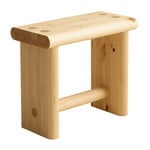
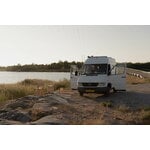

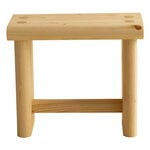
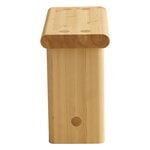
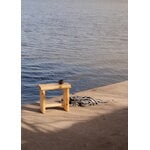
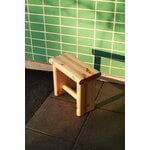
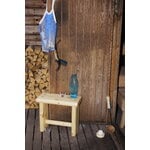
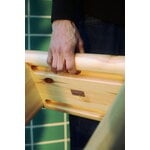
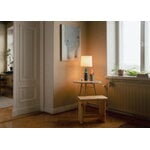
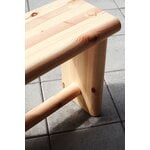
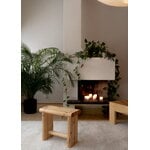
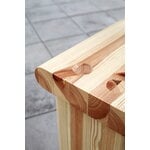
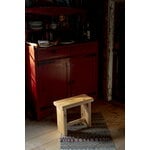
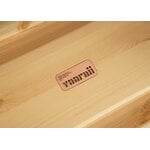
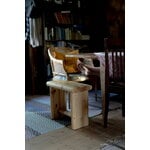
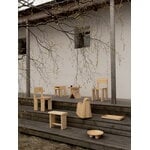
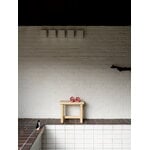
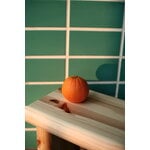

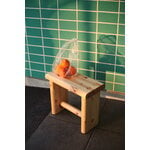
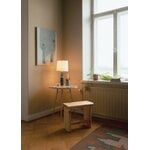
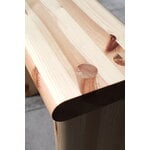
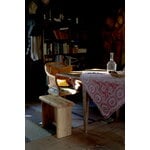
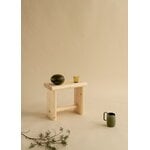
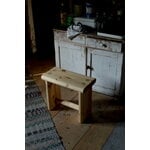
002 Ast stool, pine
Vaarnii
Description
Vaarnii’s Ast stool, designed by Dimitri Bähler, is characterised by an unpretentious design that combines the rustic with the modern. The simple and robust stool consists of thick, sturdy pieces of pinewood, its only decorations being the gently rounded edges and the knots and lively grain typical of pine. The name of the stool, Ast, is German and means “branch”, alluding to the knots that underline the strong yet often overlooked material. In addition to an extra seat, Ast can be used as a nightstand or side table.
Product details (10)
- Colour
- Oil waxed pine
- Width
- 51 cm
- Depth
- 26 cm
- Height
- 45 cm
- Material
- FSC certified pine
- Maximum load capacity
- 300 kg
- Weight
- 7.5 kg
- Stackable
- No
- Notes
- Pine is a soft wood and will suffer some dents and scratches over time, which should be embraced and enjoyed as characterful signs of aging. Pine will naturally change color as it ages with your pale piece of furniture gradually maturing to a beautiful honey color over the course of several years.
- Care instructions
- Use a microfiber cloth when dusting Vaarnii products. Do not use any solvents on wood, only water is recommended.
- Product ID
Designer
Dimitri Bähler (born 1988) is a Swiss designer whose style is defined by strong but poetic forms. His approach to design is mainly intuitive, but it is always based on careful research, whether it is an industrially produced object or an art installation. Bähler, who studied at ECAL Lausanne and the Design Academy Eindhoven, has run his own design office since 2014. He has collaborated with brands such as Muuto, HAY and Vaarnii, among others.
View all productsReviews (0)
Sustainability
The Product Sustainability Framework, our criteria of sustainable design, helps you find the most sustainable products in our selection. Read below which sustainability criteria this product has met.
Working conditions & labour 4/9
-
Equal opportunities for all employees
-
Commitment to UN Global Compact, fair compensation for all employees
-
Corporate responsibility requirements defined and communicated for suppliers
-
Transparent supply chain
Eco-friendly production 7/9
-
Fair and resource-wise water-use in production
-
No incineration or landfilling of returned items
-
No use of endangered species as materials
-
No direct environmental emissions or waste (excl. GHGs) from production
-
The sustainability of direct suppliers' production is addressed and monitored
-
Material-efficient and ecological packaging
-
No potentially harmful chemicals used in own production
Climate impact 4/8
-
Company's direct greenhouse gas emissions identified and commitment to reduction
-
Product's carbon impact identified and commitment to reduction
-
Guidance on energy- and eco-efficient use of the product
-
100 % renewable energy in own production and operations
Sustainable materials 6/6
-
Sustainable and long-lasting material choices
-
No harmful or hazardous substances
-
Responsible raw material sourcing and production
-
Materials suited for circularity: monomaterials, recyclable finishings, renewable or recycled contents etc.
-
Ecological materials: natural, biodegradable, recyclable or recycled contents
-
Outstanding materials in terms of innovativeness, responsibility, sustainability and circularity: local production or sourcing, 100 % recycled content, C2C-certification etc.
Circular design 4/5
-
High aesthetic quality promoting long-term use of the product
-
Technically durable product design and material choices
-
Design for enduring life-long quality
-
Design and support for product maintenance, repair and upgradability





























